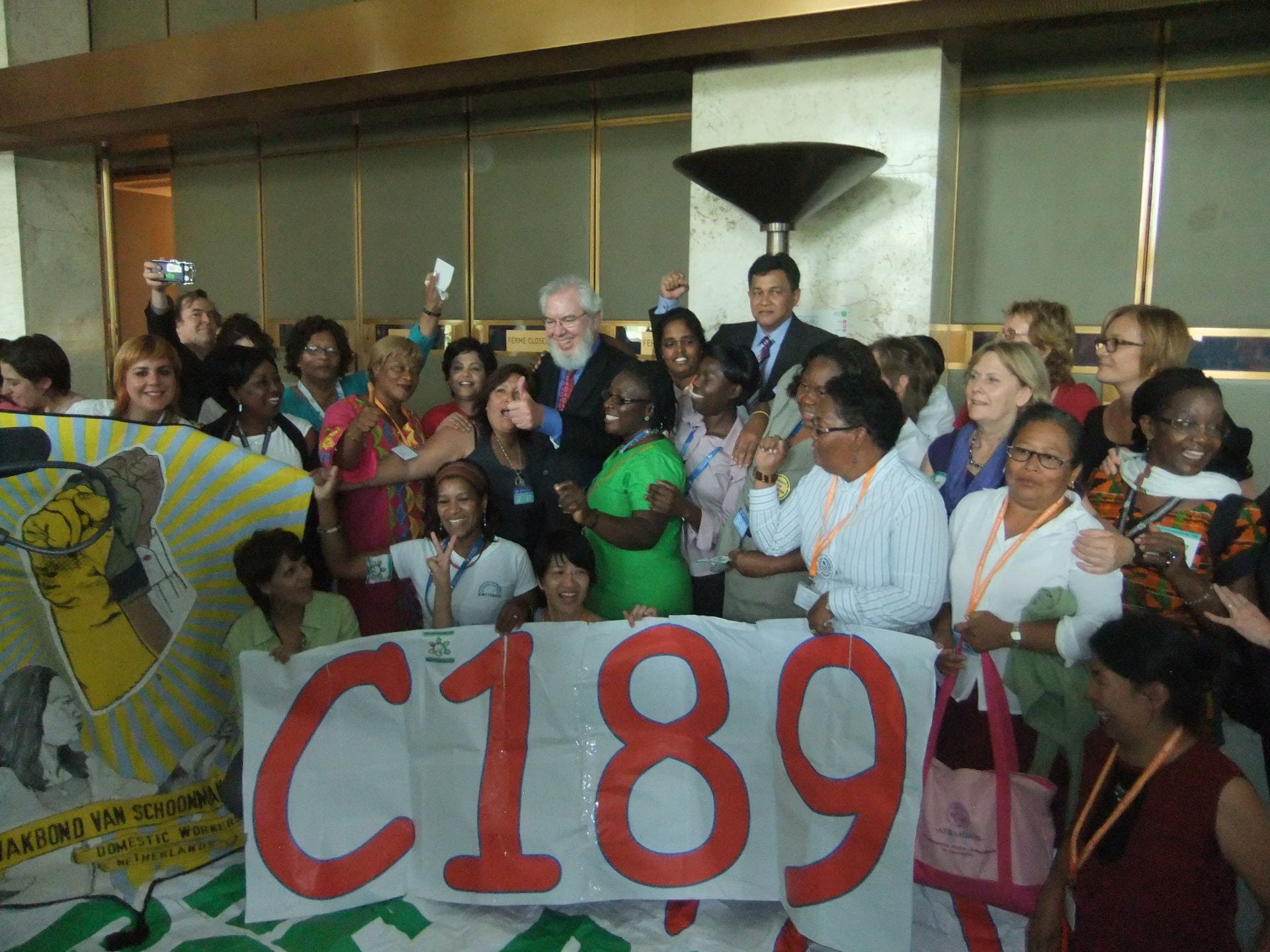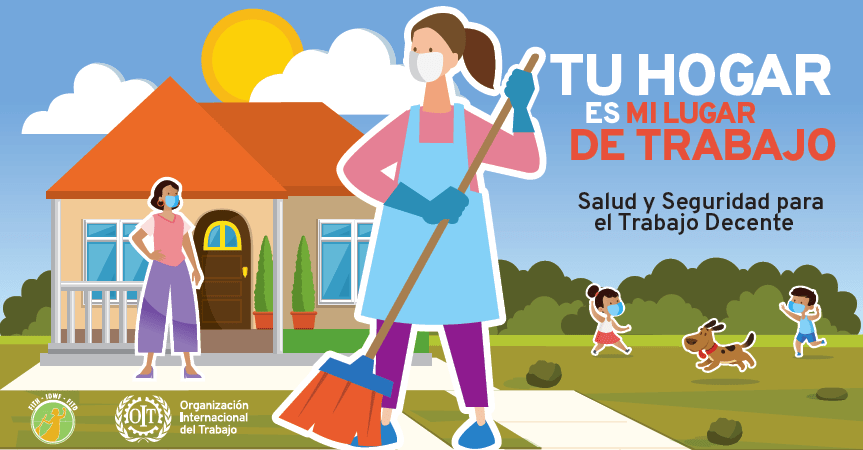“We are Not Part of Your Family; We Have Our Own”
The Domestic Workers’ Movement
In 2003, shortly before I (Adriana Paz) emigrated from my native country, Bolivia, for the first time ever, a law regulating domestic work (Law 2450) was approved, despite the fact that this occupation is older than the republican life of our country. I remember the commotion caused by the law’s approval in Bolivian society. On the one hand, middle and upper class employers predicted massive unemployment for “domestic” women and condemned the great damage that such a law would cause to the “domestics” and to society. On the other hand, for the younger generations, this shock meant the awakening of a new awareness of social justice—from practice and not from theory; from the intimate and quotidian and not from the abstract and remote. After years of organizing, the new law was an expected victory for Bolivian domestic workers, who were also aware and prepared to challenge employers’ responses after a lifetime of injustices.
The domestic workers movement throughout Latin America—which had spurred the approval of the Bolivian law— is so powerful and sector specific that it shakes individual and collective consciences historically built on the exploitation and devaluation of domestic work. At the same time, it challenges the theory and practice of the labor and feminist movements. None of these movements can be thought complete without the incorporation and adoption of the struggle of domestic workers in their political agenda and from their bases since this group of workers represents the intersection of the struggles against the oppressions of class, race, ethnicity and gender. In this sense, Law 2450 on Salaried Domestic Workers, of course, had to shake the country as it confronted us with nothing more and nothing less than the existence of colonial and patriarchal relations and practices that are normalized, naturalized and justified daily in the most immediate and intimate spheres of our lives.
The Domestic Workers’ Law 2450 in Bolivia is one of more than a dozen special rules and regulations, complementary and/or subordinate laws, decrees and legal reforms that exist in the region. These victories were achieved at the point of struggle and grassroots organization of the same organizations, unions and associations of domestic workers in the region for at least two decades. However, the materialization of these legal victories can only be explained by the long grassroots organizational history of this sector, dating back to the 1930’s in the Southern Cone (the organization of black domestic workers in Brazil created as part of the militancy of the Black clandestine communist party in 1936 led by the activist and domestic worker Laudelina Campos de Melo) and in the Andean region (the Culinary Union in Bolivia in 1935 led by Petronila Infante, an indigenous Aymara domestic worker and anarcho-syndicalist who later formed the Federation of Women’s Workers).
This long organizational tradition and fighting experience of domestic workers also explains why of the total 35 ratifications worldwide of Convention 189 on domestic workers of the International Labor Organization (ILO), 18 ratifications are in Latin America and the Caribbean. In other words, this is the world’s leading region in ratifications and legal reforms. In the words of Pedro Américo Furtado, director of the ILO Office for Mexico and Cuba, “Thanks to Convention 189, the ILO is known in almost every home and is the result of the struggle of domestic workers to get their governments to ratify this agreement.”

Photo source: WIEGO, Domestic workers during the ILC in Geneva, 2011.
From the first domestic workers’ unions in the 1930s, the Latin American movement consolidated into the first domestic workers’ confederation in the world in 1988, giving birth to CONLACTRAHO (Latin American and Caribbean Confederation of Domestic Workers). Later, in 2013, the sector made history again when domestic workers organizations from all over the world came together to create the International Domestic Workers Federation (IDWF) two years after achieving the adoption of Convention 189 during the negotiations in the International Labour Conference (ILC) in 2011. Today, the Federation is made up of 82 unions and organizations in 64 countries in Asia, Africa, Europe, North Africa and the Middle East, North America, the Caribbean and Latin America; and represents more than 600,000 domestic workers.
According to the latest ILO report, 10 years after the adoption of C189, the panorama in Latin America is as follows: of the 14.8 million domestic workers in the region, 83.4% are covered by general labor laws and regulations; 12.2% are covered by subordinate regulations or specific labor laws, and 4.4% are covered by general labor laws. In other words, in theory, domestic workers are not explicitly excluded from regulatory frameworks, but it does not mean that they enjoy the same treatment and conditions as other workers, nor does it mean that the level of legal coverage is adequate.
Although the changes to the regulatory frameworks and the creation of new national and international laws are an essential first step in the conquest of rights, it is not enough—and domestic workers know it very well. The next challenge for the Latin American movement is to address the implementation and enforcement of these progressive policies. This requires changing the balance of power between women workers and their employers in the workplace, which in most cases is also the employer’s home. It is not an easy task. Undoing the colonial social order that has built the racialization and feminization of the sector and has undervalued domestic work in society is at the core of the effective implementation of regulations.
Convention 189, although it is far from being a reality for most domestic workers who continue in informal employment, has been an indispensable advocacy tool for the sector. According to the ILO, in practice, 72.3% of domestic workers work in informal conditions due to the lack of adequate coverage of their rights. Of these, 72.3%, 67% is because of gaps in the implementation of regulations, and 5% is due to legal gaps. As a result, there continues to be a gap in Latin America between the hope of ratification or the reality of its implementation and the fulfilment of rights. Most domestic workers continue to face huge inequalities at work, and due to the isolation of their workplace, they are more vulnerable to physical and sexual abuse by employers. The IDWF study on Gender Violence in Paid Domestic Work in Latin America and the Caribbean confirms this vulnerability through a mapping of experiences enriched with interviews with 23 domestic workers’ organizations in the region.
The pandemic has further highlighted the urgent need for governments to protect the basic labor rights of domestic workers, who represent 14.3% of the economically active population in the region, according to the latest data from the ILO and the Economic Commission for Latin America and the Caribbean (ECLAC). IDWF research on Covid-19 in Latin America Fuertes y Unidas Enfrentando la Pandemia [Strong and United Facing the Pandemic] confirms that domestic workers were severely affected by the pandemic, and the urgent need for their experience and voices to be raised on the political agenda. However, the crisis also revealed a structural contradiction: on the one hand, domestic and care work is valued, but not the workers who carry out this work.
Ten years after the adoption of the C189, its potential has materialized. Workers continue to organize, train and enter into social dialogue. The role of unions, supported by regional structures such as CONLACTRAHO, and global networks such as IDWF, is to build and maintain a membership capable of winning rights and protections for the sector. At the local level, innovative organizing techniques are implemented to develop and strengthen the power of women workers. At the regional level, the sector coordinates to effectively advocate policy on identified needs. The Guía de orientaciones de Seguridad y Salud en el Trabajo frente a la COVID-19 (Occupational Health and Safety Guidance against Covid-19) is a recent example of the sector’s contributions and committed work to offer preventive measures against contagion and to promote work practices from a sustainable perspective of human rights.
Domestic workers in Latin America are united to ensure that domestic work is projected as decent work with a comprehensive care system. The Guide is an additional tool to promote safe and healthy conditions in the workplace with an additional focus on co-responsibility with employers so that they fully comply with their obligations. This protects both parties with responsibility and conviction to improve working conditions. The effective recovery of the economy and society demands, today more than ever, solutions with a gender equity perspective where the role of domestic work and care is at the center and forefront of the fight against poverty.

YOUR HOME IS MY WORKPLACE: Health and Safety for Decent Work
The Guide, developed with domestic workers, is promoted in Latin America with a variety of key messages to increase awareness on occupational health and safety.
The pandemic is not over.
Let’s continue to comply with the Health and Safety at Work protocols against Covid-19. Domestic workers and employers united against COVID-19.
Together we are stronger!
“No somos parte de tu familia, tenemos la nuestra”
Por Adriana Paz y Sofia Trevino
En 2003 poco antes de emigrar de mi país natal, Bolivia, se aprobó la Ley 2450 que por primera vez regulaba el Trabajo Asalariado del Hogar, pese a que dicha ocupación es más antigua que la vida republicana de nuestro país. Recuerdo la conmoción que causó la aprobación de esta ley en la sociedad boliviana. Por una parte, las empleadoras de clase media y media alta vaticinaban el desempleo masivo para las ‘domésticas’ y condenaban el gran daño que dicha ley causaría no sólo a las ‘domésticas’ sino a la sociedad. Por otra parte, para las generaciones más jóvenes, esta conmoción significó el despertar de una nueva conciencia a la justicia social desde la práctica y no desde la teoría; desde lo íntimo y cotidiano y no desde lo abstracto y remoto.
La interpelación que hace el movimiento de Trabajadoras del Hogar (TdH) es tan poderosa y clara que hace temblar las conciencias individuales y colectivas que históricamente han sido construidas a base de la explotación y la desvalorización del trabajo del hogar. Al mismo tiempo, desafía la teoría y la práctica de los movimientos laboral y feminista. Ninguno de estos movimientos puede pensarse completo sin la incorporación y la adopción de la lucha de las trabajadoras del hogar en su agenda política y desde sus bases ya que este grupo de trabajadoras representa la intersección de la luchas en contra de las opresiones de clase, raza, etnia y género. En este sentido, la Ley 2450 de Trabajadoras Asalariadas del Hogar por supuesto que tenía que conmocionar al país porque nos confrontaba nada más y nada menos con la existencia de relaciones y prácticas coloniales y patriarcales que son normalizadas, naturalizadas y justificadas de manera cotidiana en la esfera más inmediata e íntima de nuestras vidas y entorno familiar.
La Ley 2450 de TdH en Bolivia es una dentro de más de una docena de regímenes y regulaciones especiales, leyes complementarias y/o subordinadas, decretos y reformas legales en la región. Dichas victorias fueron conseguidas a punta de lucha y organización de base de las mismas organizaciones, sindicatos y asociaciones de TdH en la región desde al menos hace dos décadas. Sin embargo, la concretización de estas victorias legales sólo se explica debido a la larga historia organizativa de base de este sector que se remonta desde los 1930’s en el Cono Sur (la organización de las TdH negras en Brasil que nacieron como parte de la militancia del Partido Comunista Negro, clandestino en 1936 y liderado por la activista y TdH Laudelina Campos de Melo) y en la región Andina (el Sindicato de Culinarias en Bolivia en 1935 liderado por Petronila Infante, TdH indígena Aymara y anarco-sindicalista que luego formó la Federación Obrera Femenina).
Esta larga tradición organizativa y experiencia de lucha de las TdH también explica por qué del total de 35 ratificaciones a nivel mundial del Convenio 189 sobre las trabajadoras y los trabajadores domésticos de la Organización Internacional del Trabajo (OIT), 18 ratificaciones se encuentran en América Latina y el Caribe. Es decir, esta es la región líder a nivel mundial en las ratificaciones y reformas legales. En las palabras de Pedro Américo Furtado, director de la Oficina de la OIT para México y Cuba, “Gracias al Convenio 189, la OIT es conocida en casi todos los hogares y eso se debe a la lucha de las trabajadoras del hogar para conseguir que sus gobiernos ratifiquen este convenio”.

Fuente de fotografía de trabajadoras del hogar en la OIT: WIEGO
Desde los primeros sindicatos de TdH en los 30s el movimiento latinoamericano se consolidó en la primera confederación de TdH en el mundo en 1988 dando nacimiento a la CONLACTRAHO (Confederación Latinoamericana y del Caribe de Trabajadoras del Hogar). Posteriormente, en 2013 el sector vuelve a hacer historia cuando se unen organizaciones de TdH del mundo entero para crear la Federación Internacional de Trabajadoras del Hogar (FITH) a dos años de haber logrado la adopción del Convenio 189 durante las negociaciones de la Conferencia Internacional del Trabajo en 2011. La Federación, hoy en día articula a 82 sindicatos y organizaciones en 64 países en Asia, África, Europa, Norte de África y Medio Oriente, Norteamérica, Caribe y América Latina; y representa a más de 600,000 TdH.
De acuerdo al último informe de la OIT, a 10 años de la adopción del C189, el panorama en América Latina es el siguiente: de las 14,8 millones de TdH en la región el 83.4 % de ellas está cubierta por leyes generales del trabajo y regulaciones subordinadas a la ley; el 12,2 % están cubiertas por regulaciones subordinadas o leyes laborales específicas y el 4,4 % están cubiertas por leyes generales del trabajo. Es decir, en teoría, las TdH no están explícitamente excluidas de los marcos normativos pero tampoco significa que disfrutan del mismo trato y condiciones que tienen otros sectores de trabajadores/as ni tampoco significa que el nivel de cobertura legal es adecuada.
En otras palabras, aunque los cambios a los marcos normativos y la creación de nuevas leyes nacionales e internacionales son un imprescindible primer paso en la conquista de derechos, no es suficiente –y las trabajadoras del hogar lo saben muy bien. El siguiente reto para el movimiento latinoamericano es abordar la aplicación y el cumplimiento de estas políticas progresistas. Para ello es necesario cambiar el equilibrio de poder entre las trabajadoras y sus empleadores en el lugar de trabajo, que en la mayoría de los casos es también el hogar del empleador. No es una tarea fácil. Deshacer el orden social colonial que ha construido la racialización y la feminización del sector y ha infravalorado el trabajo doméstico en la sociedad es el núcleo del éxito de la aplicación de las normativas.
El Convenio 189, aunque está lejos de ser una realidad para la mayoría de las TdH que en su mayoría continúan en empleo informal, ha sido una herramienta indispensable de incidencia para el sector. De acuerdo a la OIT (ibid.), en la práctica, el 72,3 % de las TdH trabaja en condiciones de informalidad debido a la falta de cobertura efectiva de sus derechos. De este 72,3 %, el 67 % se debe a vacíos en la implementación de las normas y el 5 % debido a vacíos legales. Como resultado, en la mayoría de los países latinoamericanos, sigue existiendo una gran brecha entre la esperanza de ratificación o la realidad de su implementación y el cumpliento de esos derechos. La mayoría de las trabajadoras del hogar siguen enfrentándose a enormes desigualdades en el trabajo, y debido al aislamiento de su lugar de trabajo, son más vulnerables al abuso físico/sexual por parte de los empleadores. El estudio de la FITH sobre Violencia de Género en el Trabajo Remunerado del Hogar en América Latina y el Caribe, constata esta vulnerabilidad a través de un mapeo de experiencias enriquecidas con entrevistas a 23 organizaciones de TdH en la región.
Con la pandemia se ha destacado la necesidad urgente de que los gobiernos protejan los derechos laborales básicos de las trabajadoras del hogar, quienes representan al 14.3 % de la población económicamente activa en la región, según los últimos datos de la OIT y la Comisión Económica para América Latina y el Caribe (CEPAL). La investigación de FITH sobre COVID-19 en América Latina confirma que las trabajadoras se vieron gravemente afectadas por la pandemia y creó una plataforma para que la experiencia y sus voces se elevaran en la agenda política. Sin embargo, la crisis ocasionada por la pandemia también reveló una contradicción estructural: por una parte, se valora al trabajo doméstico y de los cuidados, pero no así a las personas trabajadoras que realizan este trabajo.
A diez años de la adopción del C189 se materializa su potencial. Las trabajadoras se siguen organizando, capacitando y entrando en diálogo social. El papel que juegan los sindicatos, apoyados por estructuras regionales como la CONLACTRAHO, y estructuras globales como la FITH, es la de construir y mantener una membresía capaz de ganar derechos y protecciones para el sector. A nivel local, se implementan técnicas de organización innovadoras para desarrollar y fortalecer el poder de las trabajadoras. A nivel regional, la Guía de orientaciones de Seguridad y Salud en el Trabajo frente a la COVID-19 es un ejemplo más de los aportes, necesidades y trabajo comprometido del sector para ofrecer medidas preventivas frente al contagio e impulsar prácticas de trabajo desde una perspectiva de derechos humanos.
Las trabajadoras del hogar en América Latina están unidas para lograr que el trabajo doméstico se vuelva a proyectar como trabajo decente con un sistema integral de cuidados. La Guía es una herramienta adicional para promover condiciones seguras y saludables en el lugar de trabajo con un enfoque, también adicional, de corresponsabilidad con las personas empleadoras para que cumplan cabalmente con sus obligaciones. Así se protegen ambas partes con responsabilidad y convicción de mejorar las condiciones laborales. La recuperación efectiva de la economía y de la sociedad demanda, hoy más que nunca, soluciones con perspectiva de equidad de género donde el rol del trabajo doméstico y de los cuidados esté en el centro y al frente del combate contra la pobreza.

TU HOGAR ES MI LUGAR DE TRABAJO: Salud y Seguridad para el Trabajo Decente
La pandemia no terminó.
Sigamos cumpliendo los protocolos de Salud y Seguridad en el Trabajo frente al COVID-19. Personas Trabajadoras del Hogar y empleadoras unidas contra el COVID-19.
¡Juntas somos más fuertes!
Adriana Paz is the IDWF regional coordinator for Latin America and OSF Fellow. Paz is a labor rights organizer and popular educator with 18 years of experience working in social justice and labor rights with low wage and migrant workers (farmworker, domestic workers, maquila workers and women’s rights groups) for grassroots organizations, trade unions and NGOs. Her expertise is to support movement building and grassroots power by translating workers’ frustrations, needs, ideas and wishes into actions, tools and strategies to support and strengthen their vision and political action.
Sofia Trevino is a development professional with more than 17 years of experience in organizational development, communications and networking. She has more than 10 years experience in program management, strategy, and hands-on development of global networks for workers in the informal economy. Trevino is currently Global Networks and Advocacy Strategist at Women in Informal Employment: Globalizing and Organizing (WIEGO) and Sustainable Development Consultant for the International Domestic Workers Federation (IDWF).
Adriana Paz es la coordinadora regional de FITH para América Latina y becaria de Open Society Foundation (OSF). Adriana es una organizadora de derechos laborales y educadora popular con 18 años de experiencia trabajando en justicia social y derechos laborales con trabajadores migrantes de bajos salarios (personas trabajadoras agrícolas, trabajadoras del hogar, trabajadoras de la maquila y grupos de derechos de las mujeres) para organizaciones de base, sindicatos y organizaciones no gubernamentales. Su experiencia es apoyar la construcción de movimientos y el poder de base al traducir las frustraciones, necesidades, ideas y deseos de los trabajadores en acciones, herramientas y estrategias para apoyar y fortalecer su visión y acción política.
Sofia Treviño, es una profesional del desarrollo con más de 17 años de experiencia en desarrollo organizacional, comunicaciones y construcción de redes de trabajadores en economía informal. Tiene más de diez años en gestión de programas, estrategia y desarrollo práctico de redes globales. Sofía es actualmente la estratega de incidencia y redes globales de WIEGO y consultora de desarrollo sostenible para la Federación Internacional de Trabajadores del Hogar (FITH).
Related Articles
Editor’s Letter
Editor's Letter Upstairs, Downstairs (and In-Between)When Argentine biologist Otto Solbrig was interim DRCLAS faculty director many years ago, he commented more than once that ReVista did not feature enough photos of middle-class people. I tried to respond to his...
Paid Domestic Workers, Women and Democracy
I first visited Peru in 1995 as a graduate student and junior member of a Latin American Studies Association delegation to examine the state of democracy in that country on the…
Invisible Commutes
English + Español
Belén García, a Colombian domestic worker, wakes up at five in the morning every day in her home in the chilly mountains of southeastern Bogotá. After taking a shower, she dresses in several…



